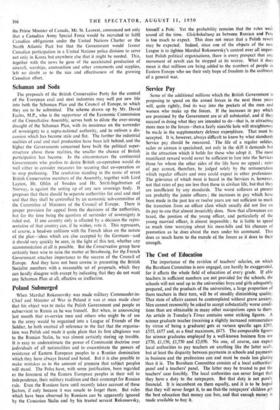The Cost of Education
The importance of the revision of teachers' salaries, on which the Burnham Committee is, now engaged, can hardly be exaggerated, for it affects the whole field of education of every grade. If able teachers in sufficient numbers are not provided for the schools, the schools will not send up to the universities boys and girls adequately prepared, and the products of the universities, a large proportion of them teachers in their turn, will be of steadily diminishing quality. That state of affairs cannot be contemplated without grave anxiety. Men cannot reasonably be asked to accept substantially worse condi- tions than are obtainable in many other occupations open to them. An article in Tuesday's Times contains some striking figures. A science graduate teacher (receiving a slightly increased remuneration by virtue of being a graduate) sets at various specific ages £393, £555, £657 and, as a final maximum, £673. The comparable figures for science graduates employed by a well-known business firm are £770, £1,150, f1,750 and £2,050. No one, of course, can expect local authorities to pay teachers on anything like the latter scale, but at least the disparity between payments in schools and payments in business and the professions can and must be made less glaring than it is. The Burnham Committee consists of a local authorities' panel and a teachers' panel. The latter may be trusted to put the teachers' case forcibly. The local authorities can never forget that they have a duty to the ratepayers. But that duty is not purely financial. It is incumbent on them equally, and it is to be hoped that they will never- forget it, to see that-the ratepayers' children get the best education that money can buy, and that enough money is made available to buy it.


































 Previous page
Previous page